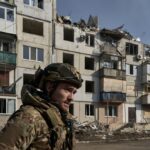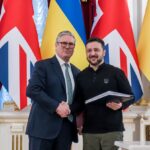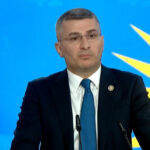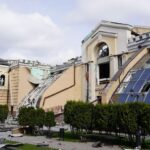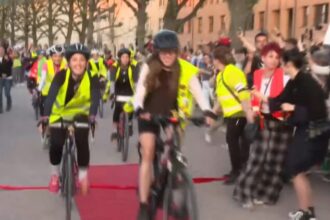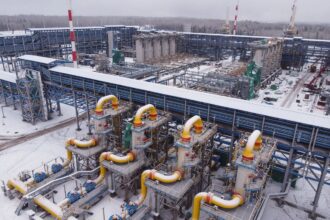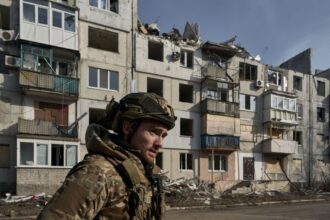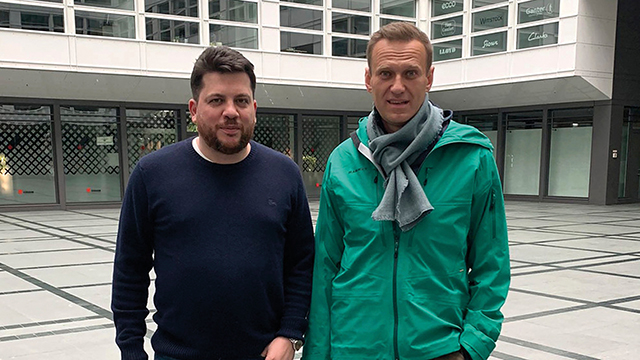“Navalny’s Russia will try and find a solution to Georgia and Ukraine but we can’t guarantee it will be easy.”
Alexey Nalny, the jailed leader of the opposition, declared a hunger-strike last week. His health is deteriorating and the Kremlin is happy to deny him medical treatment. The West has been unable to do anything to help, and with their leader in prison, Putin unlikely ever to move, it may be up to his teammates to make a difference. Many of them are living in exile, and they plan to organize a “mass protest of a size that Russia has not seen before”. It’s a huge feat, and one can be forgiven for being curious. In an interview with the Spectator, Leonid volkov, one of Navalny’s closest allies and himself in exile, discussed what Navalnyism is, Team Navalny’s vision of “European Russia,” its relationship with the West, and the proverbial “far abroad” and more.
In January, you said that Putin wouldn’t be so insane as to order Navalny’s death in prison. Are you still of the opinion that you were in January, taking recent events into account?
Well, I hope that the pressure both from inside and outside Russia will be sufficient to stop Putin from trying anything like that. We must do everything possible to create a line that Putin will be reluctant to cross. He is still rational, at least in comparison to crazy dictators; he compares the possible gains and loss from his actions. He still has a good political intuition. They didn’t shoot Navalny, but they poisoned him to avoid being blamed. It’s a wonder he survived. Now that the world is aware that Navalny was taken into custody by Putin, he will be under closer scrutiny and hopefully remain sane to not do anything.
Your “unprecedented” mass protests are a key part of your strategy for applying as much pressure as possible on Putin. You say it will be a protest that “Putin will not be able disperse.” What happens if he does?
Our plan is to get one million people on the streets. We asked half a mil people to register and publicly announce that they would be joining us. Once we reach this milestone, we will announce a date for the rally. Personal risks are lower with half a million already on the street. Even if they arrest 10 000 people, like they did in January, that’s only 2% of the total number. The Kremlin has a much harder time cracking down on large rallies. The risks are that you could be beaten, fined, shot at, or injured. But the only way to reduce these risks is by convincing people to change their collective behaviour. The risk is lower for everyone if there are more participants. We believe that a protest of a million people cannot be dispersed. The Navalny team is campaigning for Alexey’s release, but this rally is not just for Navalny supporters. If you are unhappy with Putin, for whatever reason – economic, ecological, or political – join us. You will not be heard if you are a small group. There is strength in numbers. We have a core of 500,000 people that want to free Navalny. Join us with your demands and slogans, and let’s create a huge wave of protests.
Why would Putin agree with your demands, given that this would essentially mean the end of a reign he modified his constitution to prolong?
Putin is very clear in his desire to remain in the Kremlin for as long as possible. We are not targeting Putin personally, but we do hope to create some sort of division and split within his inner circle. We want to force some of his supporters or cronies to rethink their own personal strategy. This is the most likely scenario for any change that could occur in the Kremlin.
You say, and I quote, “Our conflict with Putin is not based on ideology.” You say that his only ideology is to get rich at the expense of the Russian people. Fair enough. But what is Navanlyism? What is the political philosophy behind the movement, other than being anti-corruption?
Being anti-corruption is a philosophy because Putin’s Russia was built on corruption. It’s a cornerstone. You cannot describe Putin using terms that are familiar to Western audiences: Putin does not belong on the Left/Right scale; he’s neither conservative nor liberal as these terms are understood. He and his elite view the entire country as a source of income. He wants to eliminate institutions like a free and impartial judiciary, fair election, a free press, things that are usually associated with democratic European countries, because they don’t allow for corruption. If there are independent courts, free journalists, and free elections, these institutions can call out corruption. Because Russia lacks these institutions, Russians are no longer in a position to engage in a political debate about what kind of country they want to live in. Do they want a more libertarian or more distributive economic system? More social care or a greater focus on entrepreneurship. The Russian people don’t possess the tools necessary to shape their future. Our political philosophy is that we give them the tools and then let them make their own decisions.
Is it not also corruption that is a major issue, imperial ambitions, and the people who cheer for them? Although the wars against Georgia and Ukraine, as well as their recent aftermath, were not unpopular in Russia they still pose problems. How does Navalny & Co plan to deal with them?
Putin has left many scars on the map of the world in his 20-year tenure: Transnistria and Crimea. Belarus could easily be the next target. Putin tries to regain his popularity in Russia every time it drops. He does this by launching foreign political adventures or using military power. We used it in our campaign of 2017, when we tried to get Alexey onto the presidential ballot in the upcoming elections. We were touring the country and visited about 50 cities. He got the most enthusiastic response when he asked a question like ‘we’re now investing millions in rebuilding Palmyra, Syria. Wouldn’t we prefer to invest those million dollars in rebuilding Omsk, or the city we’re in now?’
“A possible solution to the conflict through international cooperation will also be made possible by discontinuing the huge financial giveaways to the [ed. breakaway] territories.”
People now understand that the Crimea effect is no longer an asset but a liability. Even the most ardent supporters who had no qualms in violating international borders or treaties, now realize that the annexation of Crimea has created a monstrous financial burden, as billions are being spent on those annexed areas. We use this as an argument for internal politics, not because it is in the interest of Russian taxpayers. From an external politics perspective, however, it is clear that Putin’s Russia won’t do anything to settle these disputes because this is a swamp that Putin has created. We believe that Putin may have inflicted wounds too deep to heal easily.
Unfortunately, not all crimes are easily reversible. The most common questions we receive are about the Crimea. We admit that the annexation was illegal. This was a crime both against international law and against Russian national interest, as it made Russia an unreliable and untrustworthy actor on the international stage. This has led to sanctions being imposed on Russia, but the fact remains that we still have around 2.5 million people who hold Russian passports. We must somehow take into account their wishes, and this is not an easy problem to solve. It will take many years to find a solution, and a new legal framework must be developed. Navalny’s Russia is going to try and find a solution. But we can’t guarantee that it will be easy.
All these regions are completely dependent on Russian financial and military support. Would this continue in Navalny’s Russia?
No way! It is not in the interests of Russian taxpayers that money be pumped into these territories. We believe that stopping the massive financial giveaways to these territories could also lead to a possible settlement of conflict through international cooperation.
What would the West’s relations be like if Navalny was in charge of Russia? Would Russia seek to establish closer ties with Europe and possibly join the EU?
Absolutely. Russia has always been a part of Europe. Russia has been a part Europe for a long time, and is one of the most important European powers. Russia is a part of Europe in every way: culturally, economically and scientifically. It also has a political presence. Russians are open to the idea that free trade and travel to Europe is possible. I believe they would be very excited to join the European Union. We don’t see any major obstacles to this. Despite the fact that many things will need to be adjusted and rebuilt when Putin’s rule ends.
You’ll need the West more than ever to achieve this goal. How satisfied are you with the West’s actions so far in the Navalny case? Have they called on the Kremlin for his release? What could you do better? What else can you do?
The West should go after Putin’s money because that is all Putin cares for. I think this is the most important thing we have learned. We were able to see inside his head when we did the investigative piece about his palace. We’re talking to a guy that has been in absolute power for about 20 years, and who is ruling a country that is incredibly wealthy. He could fly to Mars, he could fulfill any wish. He could have built anything he wanted as his legacy. His dream was to hoard gold-adorned items in red satin. He is most concerned about his personal wealth and money. He is definitely one of the richest people in the entire world. If you want to exert pressure on Putin, if really want to make him do something, then you need to go after his wealth.
We know that huge amounts of money are exported from Russia to Western countries. Official data indicates that capital is flowing out of Russia at a rate of $50-60 billion per year. However, this is an official figure and there are many instances of money laundering and smuggling. This money is a major contributor to the Western economies. Abramovich, for example creates hundreds of high-paying jobs in the Netherlands when he builds a new luxury boat. Or, if someone buys an apartment in Mayfair it benefits local economies. It is also important to acknowledge that this is similar to drug addiction. The longer you wait to kick the habit, the harder it is to get clean. As with drugs, it is a form of dependence. Europe must learn to resist dirty money because it corrupts European political institutions and makes them dependent on Russia.
Why do you think this hasn’t been done yet? And where could a chase after Putin and his cronies lead?
There is no political will. No questions are asked if I am a Russian official and I have 50 million pounds that I want to invest somewhere, such as in the British Virgin Islands, or the Cayman Islands. Out of that 50 million, I can spend 50,000 per year to create a few shell companies. Then I can do whatever I like.
Interview by Vazha Tavberidze
Read More @ georgiatoday.ge


